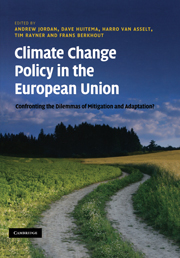Book contents
- Frontmatter
- Contents
- Foreword
- Preface
- List of contributors
- List of abbreviations
- Part I Introduction and overview
- Part II The evolving governance context: the European Union
- Part III Climate policy in the European Union: understanding the past
- Part IV Climate policy in the European Union: future challenges
- 10 Exploring the future: the role of scenarios and policy exercises
- 11 Governance choices and dilemmas in a warmer Europe: what does the future hold?
- Part V Climate policy in the European Union: retrospect and prospect
- Index
- References
10 - Exploring the future: the role of scenarios and policy exercises
Published online by Cambridge University Press: 05 August 2011
- Frontmatter
- Contents
- Foreword
- Preface
- List of contributors
- List of abbreviations
- Part I Introduction and overview
- Part II The evolving governance context: the European Union
- Part III Climate policy in the European Union: understanding the past
- Part IV Climate policy in the European Union: future challenges
- 10 Exploring the future: the role of scenarios and policy exercises
- 11 Governance choices and dilemmas in a warmer Europe: what does the future hold?
- Part V Climate policy in the European Union: retrospect and prospect
- Index
- References
Summary
Introduction
Policy exists to encourage social and environmental change now and into the future. It makes a promise about the future and, by doing so, seeks to align target groups to its goals and means. A fundamental problem in governing any policy problem is that both the governors and the target groups change their preferences over time. Another is that the prevailing system of governance does not remain stable either; it changes over time, partly as a result of the impact of policies, partly as a result of unexpected outcomes and unintended consequences from earlier policies, and partly because of exogenous changes that have nothing to do with the policy in question. As all these things continually change, so does the nature of the choices and dilemmas which confront governors when they pursue new policies and implement old ones.
In looking forward to the future of climate policy, we need to account for changes in the governance system – in our case the EU – and how these may influence the evolution of policies, their impact, effectiveness and legitimacy. But since we are focusing on the longer term (in this and the following chapter, we are mostly dealing with the period 2020–40), we need to go further still. We need to consider the possibility that governance systems will be significantly different from those prevailing today.
- Type
- Chapter
- Information
- Climate Change Policy in the European UnionConfronting the Dilemmas of Mitigation and Adaptation?, pp. 213 - 228Publisher: Cambridge University PressPrint publication year: 2010
References
- 3
- Cited by



